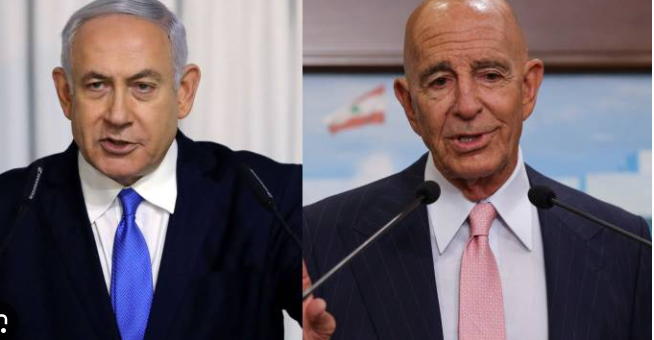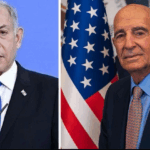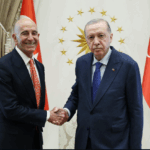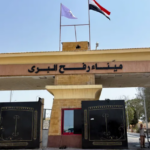U.S. special envoy Tom Barrack said Israel is not bound by the Middle East’s borders drawn under the World War I–era Sykes–Picot agreement and has the “capacity or the desire” to take over Lebanon and Syria. He made the remarks in a candid interview with online host Mario Nawfal that aired late Thursday, one of several forthright assessments from a diplomat now central to Washington’s regional outreach.
Barrack also said Syrian President Ahmad al-Sharaa will not sign the Abraham Accords with Israel, and he alluded to severely strained ties between Egypt and Israel, which he said are no longer “talking to each other or cooperating.”
The U.S. ambassador to Turkey, Barrack has been tapped by President Trump to handle a broader Eastern Mediterranean and Caucasus brief. A billionaire real-estate investor, he has clashed with the traditional U.S. foreign-policy establishment and its preference for quiet engagement with mainstream media, opting instead for shoot-from-the-hip interviews. On Thursday, he described himself as an “events-driven mercenary,” adding, “What’s going on in Gaza makes the rest of the Arab world totally freaked out.”
“In Israel’s mind, these lines that were created by Sykes-Picot are meaningless. They will go where they want, when they want, and do what they want to protect the Israelis and their borders,” Barrack said, referring to the 1916 Anglo-French pact that divided the Ottoman Levant into spheres that later shaped modern Lebanon, Syria, Jordan and Mandatory Palestine.
‘Israel can’t be so brutal’
Barrack visited Beirut this week as part of efforts to disarm Hezbollah and has been mediating talks between Syria and Israel. Pressed on whether Israel would conquer Lebanon or Syria, he said he did not mean Israel seeks to “take over” its neighbors, but that it will act against its foes. “Does Israel have the capacity or the desire to really take over Lebanon? Absolutely. Why didn’t they do it? They have the capacity to do the same thing in Syria,” he said. He added that the idea Israel keeps everyone “off balance” to gain command is, in his personal view, “ludicrous.”
Barrack is pursuing a deal in which Hezbollah would surrender its heavy weapons to the Lebanese Armed Forces (LAF), with Lebanon seeking Israeli withdrawal from the south and Gulf reconstruction funds as part of the package. He argued Israel “severely degraded” Hezbollah in fighting after the Hamas-led 7 October 2023 attacks, and he said Hezbollah accepted a lopsided ceasefire in November that Israel has used to strike Lebanon without retaliation. Israeli forces pulled back from much of southern Lebanon earlier this year but still hold five hilltops, Lebanese officials say.
Citing his Lebanese roots, Barrack said he appealed personally to Israeli Prime Minister Benjamin Netanyahu to “give Lebanon a break… give them a whiff of tolerance,” warning that being “so brutal on everybody, going anywhere, anytime you want… it’s gonna backfire.” He said Netanyahu agreed, without providing details. Two Lebanese soldiers were killed by an Israeli drone strike on Thursday; Israel apologized and called it a “technical malfunction.”
Disarming Hezbollah
Israel says it wants Hezbollah disarmed before withdrawing from Lebanese territory and ending attacks. Barrack ruled out any LAF operation to forcibly disarm the group. “There is not going to be a LAF military movement to go blow them [Hezbollah] away,” he said. “You can’t just say, ‘We want to disarm Hezbollah.’ Everybody is armed… everybody is carrying a .357 magnum. Most people have AK-47s or .50-calibre machine guns at home… this is not an environment where you are going to disarm small arms.”
He said Saudi Arabia and Qatar are willing to invest in Lebanon’s reconstruction, including in the south, where Hezbollah has long drawn support among Shia communities.
Lebanon’s 1975–1990 civil war pitted Christian, Druze and Muslim militias—including the Palestine Liberation Organization—against each other. Hezbollah emerged from resistance to Israel’s 1982–2000 occupation of the south and, with Iranian backing, has become one of the world’s most powerful non-state actors. Tehran has resisted disarmament efforts, and diplomats say Hezbollah is unlikely to relinquish its arsenal without Iran’s approval. Barrack has also courted Amal leader and parliament speaker Nabih Berri, 89, calling him essential to engaging Lebanon’s Shia base.
Though designated a U.S. terrorist organization, Hezbollah has been the target of Barrack’s public outreach. “Hezbollah is part of the Lebanese world,” he said, reiterating that blanket demands to disarm are unrealistic in a heavily armed society.
Syria not joining the Abraham Accords
Barrack said recent Israeli strikes in Syria—framed as defending Druze communities—complicate any push to convince Hezbollah to give up heavy weapons. “After Sweida, that argument has become even more impactive,” he said, noting that Lebanese communities see Israel “blow through the line” and fear “a jihadist who may not love Shias.”
He said Israel invaded a swath of southwestern Syria after Bashar al-Assad’s government collapsed in late 2024 and intends to keep its positions on Mount Hermon; Israel also carried out air strikes and a ground raid near Damascus this week. Barrack, who is mediating direct Syria–Israel talks acknowledged by Damascus last month, called President Sharaa a “pragmatist” and said engagement is “so good,” but insisted: “Can he go to the Abraham Accords? No way. He has a backing of Sunni fundamentalists.”
Background and borders
Barrack previously faced accusations of acting as an unregistered UAE agent during Trump’s first term. In the interview, he alluded to introducing Trump to Gulf leaders, helping pave the way for the Abraham Accords. He worked as a lawyer in Saudi Arabia in the 1970s, maintains close ties with UAE ambassador Yousef Otaiba, and has done business with Qatar, including a deal involving the Paris Saint-Germain football club.
Calling for broader Lebanon–Israel dialogue, Barrack warned, “We are going to evaporate as a dinosaur,” invoking his Lebanese heritage. Lebanon and Israel have no diplomatic relations but signed a 1949 armistice and continue to dispute their UN-demarcated Blue Line frontier. “You’re talking sometimes two kilometres or four kilometres,” he said. “So it’s what size pen drew the green line and the blue line and the red line. You could lose your mind over this, honestly, but people are losing lives over this… who cares?”







